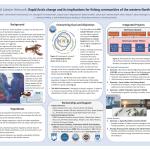Rapid Arctic change and its implications for fisheries and fishing communities of the western North Atlantic
Rapid Arctic warming is altering circulation in the North Atlantic Ocean. Resulting changes in marine ecosystems could potentially undermine regional fisheries along the coasts of New England and Atlantic Canada. These changes will present new challenges and opportunities to coastal communities. This NNA Research project focuses on links between Arctic change and the iconic American lobster (Homarus americanus) fishery. The lobster fishery is the most valuable single-species fishery in North America. It is also a well-studied socio-ecological system, making it a good subject for convergence research. The project builds a NNA Lobster Network based on cross-sector and cross-border partnerships. The project develops a climate vulnerability assessment focused on the northward geographic range shifts of lobsters in a warming ocean. This project is producing new knowledge to understand the links among climate-induced Arctic change, lower latitude marine ecosystems, and an iconic fishery in the Northwest Atlantic.
This collaborative project tests two overarching hypotheses: (1) climate-driven Arctic change will affect the distribution and abundance of American lobster stocks, and (2) the resilience of the fishing industry and coastal communities will depend on accurate information to make decisions. The natural environment is studied by oceanographers and ecologists developing a coupled atmosphere-ice-ocean-ecosystem model. This model evaluates how changes in the Arctic cryosphere and ocean circulation affect ecosystem and fishery productivity at the lower latitudes of the Northwest Atlantic. Model outputs are validated using existing field datasets, some of which are co-produced by the fishing industry. Improved predictive models resulting from this effort are used for forecasts and scenario analysis of lobster population distribution. Social systems are studied through development of a bio-economic model of the fishing fleet and evaluation of the economic reliance of the fishery. The NNA Lobster Network leads to a broadened understanding of physical, biological and socio-economic conditions at varying scales of interest under past and future climate and management scenarios.
This award reflects NSF's statutory mission and has been deemed worthy of support through evaluation using the Foundation's intellectual merit and broader impacts review criteria.
Co-Principal Investigators
Resources
The NNA Lobster Network: Rapid Arctic change and its implications for fishing communities of the western North Atlantic
Rapid Arctic warming and melting are altering ocean circulation in the North Atlantic, triggering ecosystem changes likely to undermine regional fisheries of New England and Atlantic Canada. These changes will challenge coastal communities, presenting new threats and opportunities. This NNA Research project focuses on links between Arctic change and the iconic American lobster fishery, the most valuable single-species fishery in North America, and a well-studied socio-ecological system.
Publications
Wu, J., Z. Lee, J. Goes, H. do Rosario Gomes, and J. Wei, 2024: Evaluation of three contrasting models in estimating primary production from ocean color remote sensing using long-term time-series data at oceanic and coastal sites, Remote Sensing of Environment, 302, https://doi.org/10.1016/j.rse.2023.113983
